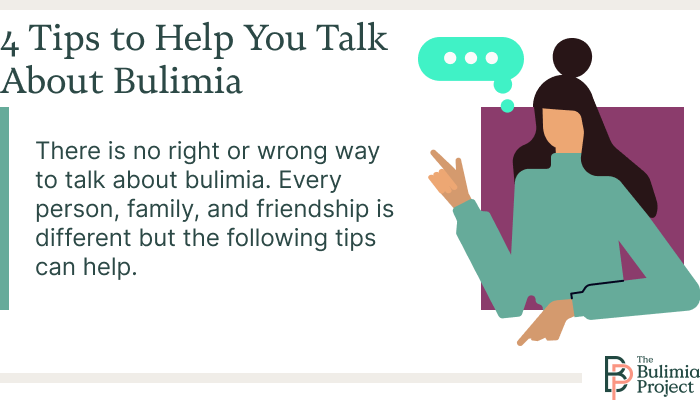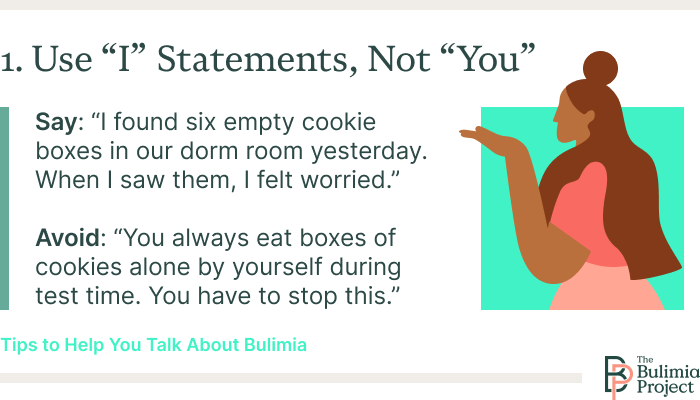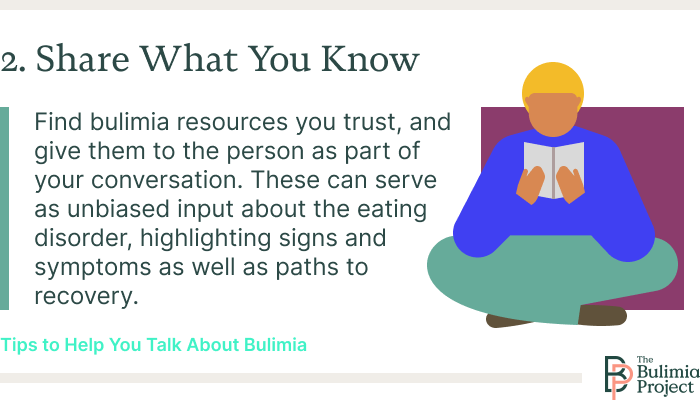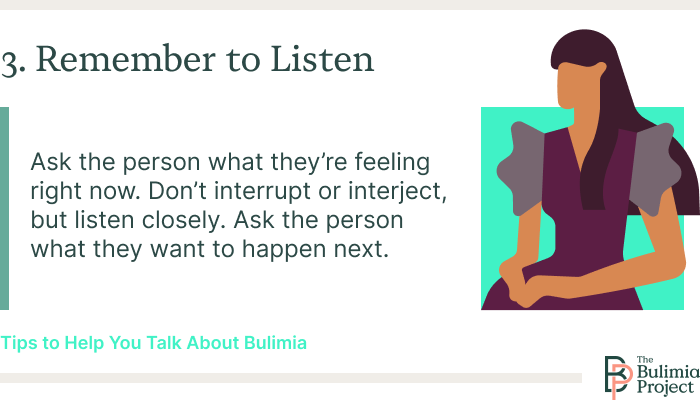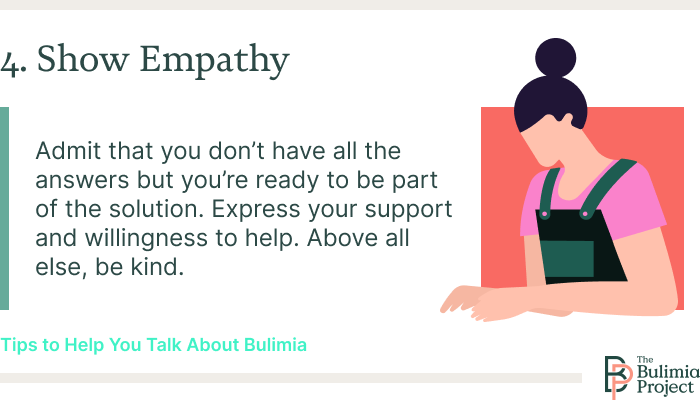Bulimia is a treatable mental health condition. Willpower alone can’t keep someone from bingeing and purging. But a tailored treatment program can help them both understand and control their impulses.
The frank, kind conversation you have could push the person you love into treatment. And your ongoing support could mean the world to someone in need.
What Does Bulimia Look Like?
Secrecy surrounds all eating disorders, including bulimia. Many people go for weeks, months, or even years without detection. But some telltale signs exist. These signs may prompt you to start a conversation. The person you love may do the following:
- Change eating habits. The person won’t eat around you or other people at all. If the person does share a meal, a quick trip to the bathroom happens right after eating. They may run the water in the bathroom to hide sounds of vomiting, and they may pop a breath mint on their way back to the room.
- Exercise obsessively. Running, weightlifting, or using exercise machines becomes a core part of the person’s everyday life. Exercise sessions continue even when the person is hurt or injured. They feel stressed or irritated if they can’t exercise every day.
- Limit conversation topics. You talk about how other people look, how much weight someone has gained or lost, or what diets are effective. Most of their conversations center on body image or the scale.
- Display hand wounds. If the person uses vomiting to purge, teeth marks may appear on the dominant hand. This may look like scratches or abrasions. These injuries may harden into calluses. (1)
Don’t let weight loss or gain be your guide. Many people with bulimia are at a normal weight, and some are overweight. Instead, look for signs of bingeing, purging, and dieting.
If you notice these signs of bulimia, it’s time to talk to your loved one.
4 Tips to Help You Talk About Bulimia
Find a quiet, private space to talk with the person you love. Don’t set the scene with food and drink if you can help it. But do keep music and other distractions to a minimum.
You’re talking about something very important, and you want the person to take your talk seriously. Don’t let other things take away from the conversation at hand.
There is no right or wrong way to talk about bulimia. Every person, family, and friendship is different. These tips can help, but feel free to tweak them to fit your loved one’s situation.
1. Use “I” Statements (Not “You”)
Discuss the symptoms you have seen, and highlight how they make you feel. Speak from your own specific experience rather than accusing someone of making mistakes.
Accusations make people feel attacked, and that can derail your conversation. Remember that it’s natural for the person to feel defensive, so you want to smooth the talk as much as possible. (2)
Imagine that you’ve found empty cookie and cracker boxes under the person’s bed, and you’re worried the person ate them in a binge.
- Say: “I found six empty cookie and cracker boxes in our dorm room yesterday. When I saw them, I felt worried.”
- Avoid: “You always eat boxes of cookies alone by yourself during test time. You have to stop this.”
Imagine that your friend is using exercise to lose weight.
- Say: “I am worried about how frequently you’re going to the gym, even when you’re sick.”
- Avoid: “Why do you go to the gym all the time? What good will it do?”
2. Share What You Know
Remember that bulimia is a mental illness, not a moral failing. The person you love may know this deep down, but pride and shame can keep them from admitting that an eating disorder is present.
Find bulimia resources you trust, and give them to the person as part of your conversation. These can serve as unbiased input about the eating disorder, highlighting signs and symptoms as well as paths to recovery.
The person may not want to read them right now, but they could make good independent study resources later.
3. Remember to Listen
You’re not providing an educational lecture. You’re attempting to help someone in need, and that person has thoughts and opinions. Make space for them.
Ask the person what they’re feeling right now. Don’t interrupt or interject, but listen closely. Ask the person what they want to happen next. (3)
4. Show Empathy
It’s easy to offer solutions, such as “stop doing this” or “just eat at mealtimes.” You may be tempted to convince them that they are a perfect weight already. But simplistic solutions can leave the person you love feeling misunderstood or defensive. (5)
Admit that you don’t have all the answers but you’re ready to be part of the solution. Express your support and willingness to help. Above all else, be kind.
How to Find Treatment for Bulimia
If the person you love is 18 or older, or you’re not in a legal guardian’s position (such as a parent or a spouse), you can’t compel the person to get care. You must entice the person to seek help to change.
Keep talking about bulimia, and encourage the person to visit a doctor or counselor. Offer to drive the person to those appointments, or stay in the waiting room during the sessions to provide ongoing support.
Some people are ready to enroll in bulimia treatment programs immediately, and they’ll ask about the next steps when your conversation ends. But some people need more time to think about your talk and decide what to do next. Be ready for either route and be open to your friend’s unique journey to recovery.
3 Ways to Support Recovery
While you’re talking to the person you love, treatment is at the front of your mind. But what happens when the person enrolls in care? You still have work to do. Follow these suggestions.
Don’t wait for the person to reach out to you with an invitation to spend time together. Keep inviting the person to spend time with you, just as you did before you talked about bulimia. (6)
Your loved one may not be ready for social activities, but you’ll demonstrate that you care and that there is life after treatment. Once they are ready, they may feel comforted and even excited to know that you are ready for them.
Your friend may choose to reveal difficult thoughts or well-kept secrets. Some of the things your loved one shares may upset or worry you.
Listen as open and honestly as you can, and try not to offer advice. Your job is to listen well and accept the person as they are right now. You don’t have to solve the problems — just listen. (7)
The person you love is working hard to develop new thoughts, habits, and behaviors. But it’s not uncommon for binge/purge episodes to return.
A relapse is part of recovery, and it gives the person insights into treatment and long-term recovery. If the person tells you about a relapse, try not to get angry or upset. Relapse is not a failure; it’s part of the process. (8,9)
Be supportive and help guide the person back to treatment. Over time and with a stronger footing in recovery, relapse becomes less likely
Take Care of Yourself
Focusing on someone with bulimia can be stressful and upsetting. Remember to attend to your physical and mental health too.
If you’re struggling, reach out to your doctor and ask about support groups or other resources in your area. You could need a little touchup to stay healthy.
Resources
- Bulimia Nervosa. (February 2022). Kaiser Permanente.
- How to Talk to a Loved One About an Eating Disorder. National Eating Disorders Association.
- Approaching Someone. The Eating Disorders Association of Ireland.
- How to Start a Discussion With Someone You Think Might Have Bulimia Nervosa. Bulimia Guide.
- How to Talk to a Loved One About an Eating Disorder. (February 2019). Cedars Sinai.
- How to Help Someone With an Eating Disorder. National Health Service.
- How to Support Someone with an Eating Disorder. National Eating Disorders Association.
- Caring for Someone with an Eating Disorder. National Eating Disorders Collaboration.
- Relapse in Anorexia and Bulimia Nervosa – A 2.5-Year Follow-Up Study. (May 2005). European Eating Disorders Review.
